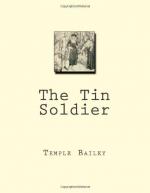The old man had recovered himself. “We are not here to talk of killing, but of what I and my friends shall make for you. And you are to have lunch with us? I have planned it, and I won’t take ‘no,’ Fraeulein. You and I have so much to say to each other.”
Emily wondered if it were really her middle-aged and prosaic self who sat later at the table, being waited on by a very competent butler, and deferred to by the two men as if she were a queen.
It was she and the old man who did most of the talking, but always she was conscious of Ulrich’s attentive eyes, of the weight of the quiet words which he interjected now and then in the midst of his father’s volubility.
“Germany, my mother, is dead,” wailed the old man. “I have wept over her grave; those who wage this war against humanity are bastards, the real sons and daughters of that sweet old Germany are here in America—they have come to their foster-mother, and they love her.
“If I had been younger,” he went on, “I should have fought. My son would have fought. But as it is we can make toys—and we shall say to the Prussians across the sea, ’You have killed our mother—your people are no longer our people, nor your God our God.’”
Ulrich took Emily home. She carried with her a Noah’s Ark, and a precious pot of cyclamen. She had chosen the cyclamen out of all the rest. “It is such a cheerful thing blooming in my shop.”
“There are other cheerful things in your shop,” he told her.
As she met his smiling eyes, she smiled back, “Do you mean that I am a cheerful thing?”
“A rose, mein Fraeulein, when your cheeks are red, like this.”
Emily, alone at last in the Toy Shop, took off her hat in front of the mirror and saw her red cheeks. She set the cyclamen safely in a warm corner. The four elephants with their fragrant freight of violets made an exotic and incongruous addition to the Christmas scene in the window.
Bruce McKenzie, coming in, asked, “Where did you get them?”
“The elephants? Ulrich Stoelle brought them. Do you know him?”
“Yes. But I didn’t know that you did.”
“His father makes toys. I lent him my white elephant, and he made these—”
She spoke without self-consciousness, and McKenzie’s mind was on his own matters, so they swept away from the subject of Ulrich Stoelle. “Emily,” Bruce said, “I have my orders. Tomorrow at twelve I must leave for France.”
She gazed at him stupidly. “Tomorrow—?”
“Yes.”
“But—Jean—?”
“I haven’t told her. I don’t know how to tell her.”
“You won’t be here for the wedding—?”
“No.”
“It will break her heart.”
“You needn’t tell me that. Don’t I know it?” His voice was sharp with the tension of suppressed emotion.
He dropped into a chair, then jumped up and placed one for her. “Sit down, sit down,” he said, “and don’t make me forget my manners. Somehow this thing gets me as nothing has ever gotten me before. It isn’t that I mind going—I mind hurting—Jean—”




